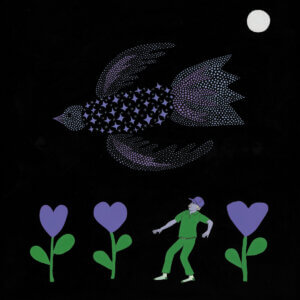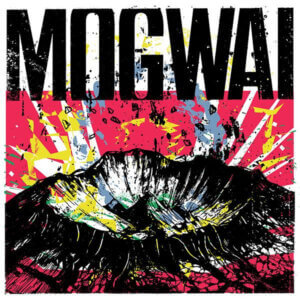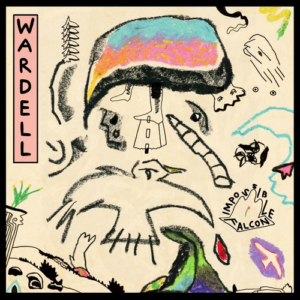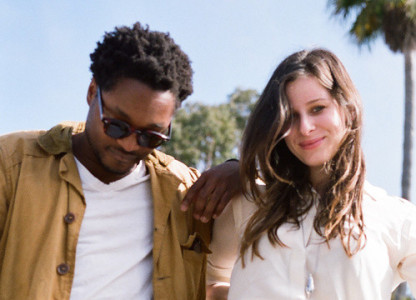Interview with Saha and Theo from ‘Wardell’
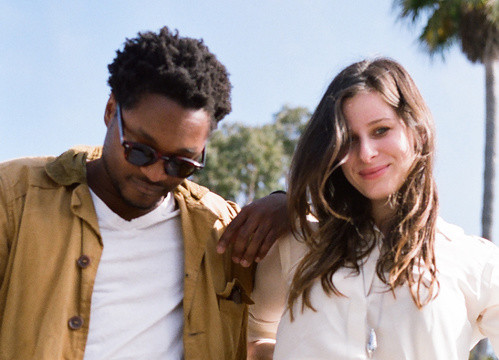
Growing up in Hollywood with a famous father, in my mind, would give the members of Wardell, Sasha and Theo Spielberg endless opportunity to become jaded, but as we wait for Sasha to join the conference call, I realize in the first twenty seconds of talking with her brother, that couldn’t be farther from the truth. Their exuberance on the other end of the phone is palpable as they talk from opposite ends of the country.
With Theo in New York and Sasha in LA, their debut album Love/Idleness is the product of a brother and sister a country apart. This opposition is a perfect metaphor for the album: part CBGB’s, part Hollywood Bowl, part cement, part sand… a perfect harmony of both sibling’s fundamental sensibilities. The album listens like a scrapbook of postcards, each time stamped from different eras, detailing the current mood, emotion, feeling of the person writing them – alternating “Greetings from New York”, “Greetings from LA”, punctuating each milestone. There is a refreshing and intense consciousness to not only their album, but the way they talk about their music that proves the notoriety of their last name will no longer be solely bound to film industry. I spoke with the bright minds behind Wardell about the method behind their music.
NT: You guys have said that The Strokes are sort of a middle ground where both your musical
tastes can agree… to me, their album ‘Is This It’ is sort of the perfect first impression of that
band, when releasing Love/Idleness, what things were sort of “must-haves” that you wanted to
put out there in terms of people getting to know your sound right off the bat?
TS: I think that ‘Funny Thing’, the first song on the album is pretty indicative to our sound. It sort
of runs between a sort of revved up version of our sound – it ends with a revved up version, but
beings with a more low key version. Often times we try to walk the line between those two
things.
NT: So sequencing then must have been really important to you because right off the bat you
set the mood for the rest of the album.
TS: Ya, I became very obsessed with sequencing. Do you ever have that sensation where you
like listen to an album a million times and you hear a song out of context for the first time and as
soon as the song ends you start singing the next song in your head?
NT: Wow yes! I’ve never heard someone say that out loud as a fully formed thought before,
that’s huge.
TS: So I think that if you do that, all these songs have like a context in which they live in which is
clearly super important and almost like, totally subconscious, you don’t even realize how much
you associate these things with each other. Sometimes a song, when it’s not presented in the
right context, for no good reason you might just totally discount it. Like I’ve heard songs that
weren’t the right vibe, that I could have loved otherwise. So I think that because so many of our
songs can run the spectrum that we were talking about earlier that I think it’s really important
that our songs are presented in the right way.
NT: Again into relation of the Strokes, in one interview you mentioned how on the EP, the
recordings had some human error, but in a good way… which is one of the best parts of the
Strokes recordings as well, how were you able to let go of the perfectionist side of recordings
and keep those imperfections?
SS: Well with the vocals, Theo really helped me because I would record something and listen to
it back and be like ‘No no no, we gotta do it over again, my voice does this weird thing here,’
and Theo would be like ‘No, dude that’s the coolest’. I think I always do this because I was
obsessed with American Idol and always sing songs and try to hit all the notes perfectly and
sound perfect and on stage I find when I mess up, I don’t mind, but in the studio, it’s going to be
forever so… It’s kind of like once you bring in the live element, where you don’t care as much,
and it’s instinct, I think that’s when it becomes good and Theo really helped me with that,
otherwise I’m a crazy perfectionist.
NT: So there’s almost a catharsis in letting go and keeping those things in there.
SS: Ya! And I would not have that without Theo.
TS: It also helps that we only had ten days. The other thing is, and we sort of did do this with our
EP, I recorded it on the computer and obviously they’re all just demos but really before we did
the EP proper, but it had all these imperfections that we tried to redo in the studio which sort of I
guess, the way I understand it, is the way The Strokes did it. They would record it and
retroactively make it sound all janky and I think for this, as opposed to the EP, it was weirdly
more raw leaving it like we had it, rather than turning it into something super lo-fi, because we
were in a real studio for the first time.
NT: Theo, you have a background in music journalism, how does your knowledge of the industry
shift your perspective on stepping out on the other side of it?
TS: I don’t know… I think it just annoys some people! I try not to think about it that much but I
think that sometimes you want your thoughts as an artist to be completely unfiltered or
unadulterated by some sort of industry standpoint.
NT: A lot of people credit your pop sensibilities to Sasha, your love of like 90s girl pop (Christina
Aguilera, Spice Girls), but also have songs like Dancing on the Freeway, that sounded more like
80s Bruce Springsteen… both great times for the genre. What do think about the current state of
pop music ?
SS: I think right now that everyone is pulling every genre into one sound, it’s very exciting and
cool. I also think that for every Christina reference I have, Theo would buffer it with a Bruce
Springsteen reference. He countered every pop reference I have with an acid rock reference
and we’d meet in the middle.
TS: Or like sometimes I would send her a chord progression, where there was nothing pop
about it and she would sing this great pop melody over it, and it would be something that never in a million years I could imagine it would end up like. Then all of a sudden, it’s our sound.
NT: So you sort of need each other’s different sensibilities to complete a song?
SS: Ya!
TS: Ya!
NT: Back to the 90s, when you were first putting Wardell’s sound together, you guys were living
on opposite ends of the country and used a method that was pretty huge in the 90s with bands
like Neutral Milk Hotel, where you recorded initial ideas of songs as answering machine
messages…. while seemingly distance is a pain in the ass, is there a certain romance to that
technique?
SS: Ya totally! I am the biggest fan. I wish voice notes could sponsor us. I think there’s
something so cool about creating something when we’re three thousand miles apart. It’s like a
fax machine, it is so 90s! I remember the first time using a fax machine I could not believe you
could chat with people that far away. It was the first form of AIM and it blew my mind, then I
think with voice notes… like I think there is something so cool about Theo sending me a note of
a chord progression, me sending him a voice note of vocals on top of his chord progression on
a Garage Band track. It’s awesome. I feel like we’re in eighth grade again.
TS: But you know acutally, the other thing that’s really crazy, that sometimes when we’re in the
same room, me and Sasha will take voice notes at the same time from different places in the
room. Like different points in our practice. You can kind of come up with totally different vibes
from Sasha’s phone versus my phone, even though technically they are from the exact same
session. So there is a sort of weird personality that a voice note imbues on whatever you’re
recording.
NT: Do you think you could have made the same album without voice notes, without distance?
TS: We couldn’t have made the album without voice notes, for sure.
SS: And if we were in the same city, we’d be in the same room working on songs getting
frustrated, whereas when you have distance you’re kind of forced to listen to so much music.
We would always make playlists and send each other songs that were sort of inspirational to us
and then sit with the songs for a week and see what we come up with in separate states.
NT: I watched an interview with the guys from comedy troupe, Good Neighbor, where they said
you were big fans of theirs…
SS: Oh my god! I totally forgot about that. They’re hilarious.
NT: Clearly you guys have really good taste, what are some things that you’re into right now that
aren’t getting enough attention?
SS: My iPod thing broke in my car so I’ve just been listening to Emmylou Harris, Wrecking
Ball… and I have been listening to that like it’s my job. I talk to a bunch of people it and they’re
all like ‘Oh yeeaah… I know it…” but it’s like a really insane record. And I’m sure everyone was
talking about that when it came out of course. But personally right now something that isn’t as
known… I don’t know. It seems like everything I love always ends up blowing up.
NT: Like Good Neighbor!
SS: Ya! And The Shakes, The Alabama Shakes… we posted about them when they were called
The Shakes on our Facebook page and then they just BLEW UP.
TS: I love the band DEERS… and they changed their name to __—. As far as things though
that I believe should get a lot more attention, this band that I’ve listened to for years, called Zulu
Pearls and they’re incredible. They’re based in Berlin now, but I ended up meeting the guy and
have hopefully convinced him to come back to the states. Any fan of The Strokes will be a huge
fan of Zulu Pearls.
NT: Sasha, you just mentioned that you listened to Emmylou Harris like it was your job, and now
that music is your job, how are you liking it? It it not the coolest job to have in the world?
SS: Oh my god, it’s so cool. I keep forgetting that it’s my job. I guess it’s because it’s been like
like a passion… that sounds so cheesy… that was the cheesiest thing I’ve ever said, but it’s so
fun to do exactly what you love. I just think there’s something so great about that. I haven’t even
really thought about it or I else I freak out.
NT: And Theo you’ve said in other interviews that you always wanted to be in a band, and now
you’re living it too… what’s it like?
TS: It’s sort of like Sasha said, it’s one of those things that if I truly start to think about it my head
would explode. In some sense it’s still like making a song is making a song and it rarely comes
out of a censored professional duty.
NT: Does having this be your career now change your writing style now that pressure’s on a little
bit, or is it sort of the best part that this is what you know you get to do now?
TS: Oh, I don’t know about Sasha, but I think my writing style has changed a lot… but it’s
always changing.
SS: Mine too… but that happens when I discover music. Like Emmylou Harris, now I’ve been
writing all these songs and singing to kind of emulate her, and that happens a lot. I’m constantly
being inundated with information and it’s so cool and it inherently changes your writing style for
sure.
TS: It’s funny going back to when I – like going back to high school songs and being like that’s
clearly when I started listening to Spoon. It’s very apparent in my writing, then hopefully over
time it gets folded in instead of like, ‘Well this guy was clearly listening to a bunch of Radiohead
albums’!
NT: I vowed to not bring up your dad in this interview, but I have had a long standing debate with
a friend about what E.T. would smell like, and you two are really the authority figures on the
matter… so, final question, what would E.T. smell like?
SS: That’s hilarious! I honestly think he smells like the ride at Universal Studios.
TS: That’s what I was going to say! It has such a specific smell, like a fog machine!
SS: Mixed with like Reese’s Pieces and maybe a little B.O.
Latest Reviews
Tracks
Advertisement
Looking for something new to listen to?
Sign up to our all-new newsletter for top-notch reviews, news, videos and playlists.
